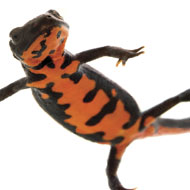
Restrictions imposed to prevent the spread of deadly disease
Immediate restrictions have been imposed on the commercial salamander and newt trade in order to prevent the spread of a deadly fungal disease.
Native to Asia, the newly-discovered flesh eating chytrid fungus is thought to have been introduced to Europe via amphibians imported for the exotic pet trade.
The disease has recently brought fire salamander populations in the Netherlands to the brink of extinction, causing up to 96 per cent decline, and is feared to have devastating effect on amphibian biodiversity elsewhere in Europe.
The restrictions were implemented by the Standing Committee of the Convention on the Conservation of Europe Wildlife and Natural Habitats (Bern Convention) during its annual meeting in France last week.
The move has been welcomed by the Animal Protection Agency (APA), who stressed the importance of its urgent implementation.
APA director Elaine Toland said: “The risk of importing new and unknown pathogens is inherent to the international exotic pet trade, which far too often has been allowed to continue regardless.
"We are thankful therefore for this recommendation and trust that Member States will take the urgent steps that need to be taken to stop the trade in salamanders and newts over the next few weeks. In the longer term, the EU should adopt a precautionary approach to the exotic pet trade and implement positive lists and bans where necessary.”
As well as stopping the trade of salamanders and newts, the Committee has also recommended that a scientific risk assessment be carried out to assess detailed aspects of the new controls.
The APA say that the disease is already infecting wild amphibian populations in Belgium and has reached Germany. In the United Kingdom, where it has affected captive salamander collections, reserve managers are concerned about the threat posed to the declining great crested newt. In the next few days, Defra are expected to follow the recommendation and issue advice.
Commenting on the measures, Dr Silviu Petrovan, conservation coordinator at Froglife, the UK amphibian and reptile conservation charity said: “Decisive and rapid implementation of these measures is needed, coupled with adequate implementation of biosecurity protocols for people and organisations working with wetlands and amphibians. These will help stop the spread of this deadly fungus, which could wipe out a hugely important part of our biodiversity.
"The UK has three species of native newts and hosts internationally important populations of the European protected and declining great crested newt, all of which are at risk from this new disease."



 The Veterinary Medicines Directorate (VMD) is inviting applications from veterinary students to attend a one-week extramural studies (EMS) placement in July 2026.
The Veterinary Medicines Directorate (VMD) is inviting applications from veterinary students to attend a one-week extramural studies (EMS) placement in July 2026.